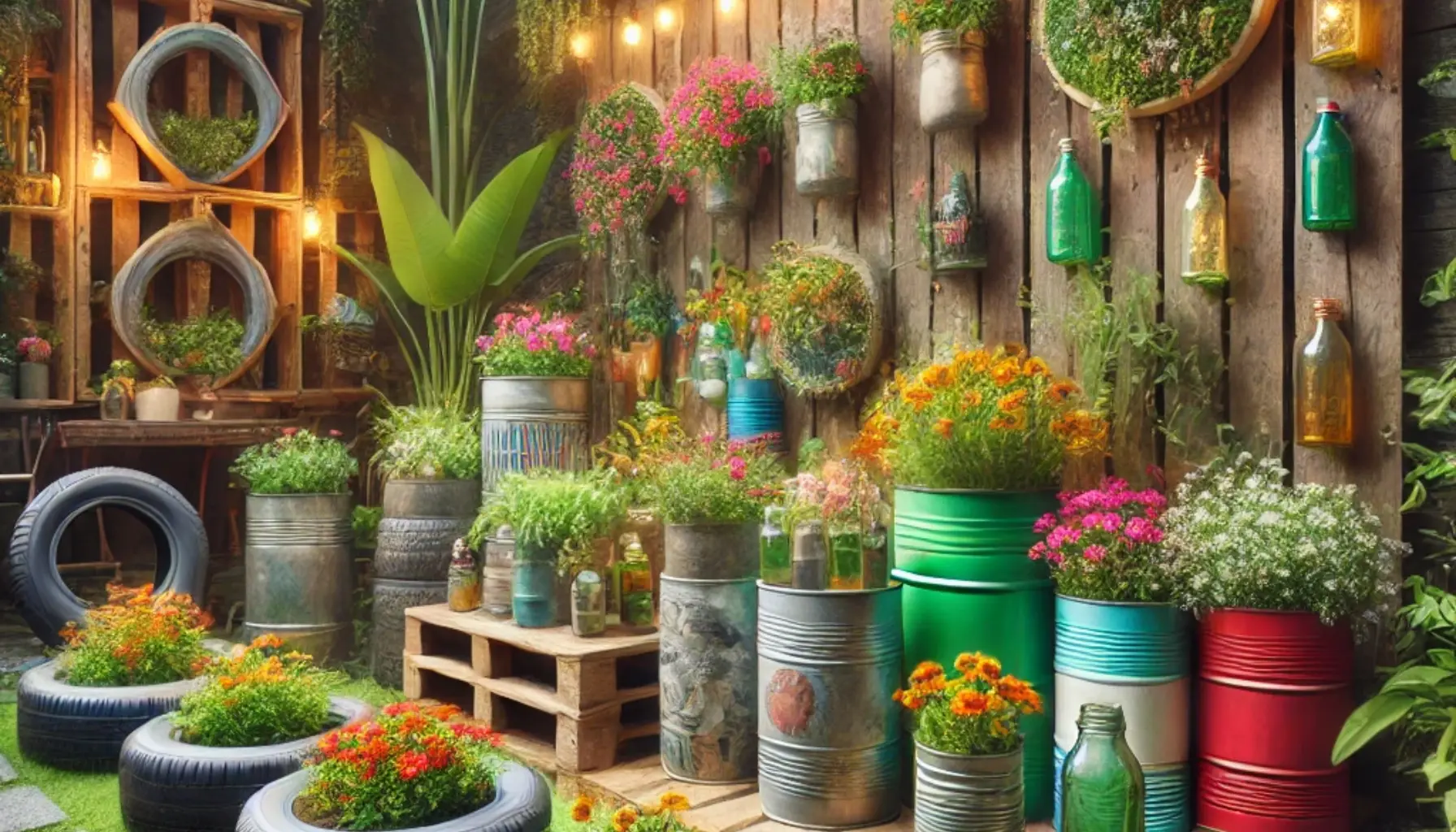Gardening can be an enjoyable and rewarding activity, but it often comes with the misconception of being expensive. By utilizing recycled materials, you can craft a beautiful and sustainable garden without spending a fortune. Everyday items like old containers, glass bottles, and even discarded furniture can be repurposed to create a thriving, eco-friendly green space.
This guide provides practical advice on how to transform recyclable waste into a unique garden. With a little imagination and effort, you’ll not only save money but also contribute to environmental sustainability.
Why Choose Recycled Materials for Your Garden?
Creating a garden with recycled materials is more than a cost-saving strategy—it’s an environmentally conscious decision. Repurposing items reduces landfill waste and promotes a sustainable lifestyle.
Recycled gardening also allows for creative expression. From handmade pots to innovative decorations, you can design a space that reflects your personality. Additionally, recycled materials often have a rustic charm that adds character and uniqueness to your garden.
By adopting this approach, you not only create a one-of-a-kind garden but also help preserve natural resources, making your gardening journey meaningful and eco-friendly.
Creative Planters from Recycled Items
Repurposing household items as planters is an easy and practical way to start your recycled garden. You’d be surprised at how many materials can be reused to grow plants effectively.
Here are some ideas for recycled planters:
- Plastic Bottles: Cut them into halves for small planters or leave them intact for vertical gardens.
- Tin Cans: Paint them in vibrant colors to create stylish pots for flowers or herbs.
- Old Tires: Stack and paint them to make raised flower beds or whimsical plant holders.
- Wooden Drawers and Crates: Use them as rustic garden beds or tiered displays for potted plants.
Don’t forget to add drainage holes to your planters. This simple step ensures the health of your plants and prevents waterlogging. Recycled planters are an affordable and eco-friendly way to create a personalized garden.
Decorating Your Garden with Recycled Materials
Recycled materials can also be turned into stunning decorations to enhance your garden’s aesthetic appeal. With a bit of creativity, items that might otherwise be discarded can breathe new life into your outdoor space.
Here are some decoration ideas:
- Glass Bottles and Jars: Hang them as lanterns with candles or string lights inside.
- Broken Ceramics: Use shards to create colorful mosaics on pathways, pots, or walls.
- Wooden Pallets: Transform pallets into vertical gardens or garden furniture.
- Old Utensils: Repurpose forks, spoons, and teapots as quirky hanging decor.
These unique touches not only save money but also create a personalized and artistic vibe that sets your garden apart from the ordinary.
Recycled Materials for Planting and Soil Enrichment
Recycling isn’t just for decoration and planters—it can also be applied to support healthy planting and soil preparation. Recycled materials can enrich your soil, reduce waste, and keep your plants thriving.
Here are some ways to recycle for planting:
- Compost: Convert kitchen scraps like vegetable peels, eggshells, and coffee grounds into nutrient-rich compost for your garden.
- Cardboard and Newspaper: Use these materials as a weed barrier under mulch or soil.
- Plastic Containers: Repurpose old containers for seed starting or plant propagation.
- Broken Pottery: Use pieces of broken pots as a drainage layer in larger planters.
By incorporating these recycled materials, you’ll improve your garden’s sustainability while reducing waste.
Building Garden Furniture with Recycled Materials
A garden isn’t complete without comfortable and functional furniture. Instead of purchasing new items, consider making your own using recycled materials.
Here are some ideas:
- Wooden Pallets: Create benches, tables, or shelving units from old pallets.
- Tree Stumps: Use them as rustic stools or small tables.
- Old Chairs and Tables: Repair and repaint furniture to give them a second life in your garden.
- Concrete Blocks: Stack them creatively to build durable seating or planter stands.
These DIY projects not only reduce costs but also add a unique charm to your garden.
The Benefits of a Recycled Garden
Creating a garden using recycled materials offers numerous benefits:
- Eco-Friendliness: Repurposing items reduces waste and contributes to environmental conservation.
- Cost Savings: Avoid spending on expensive gardening supplies by using what you already have.
- Creativity: Recycling allows for endless possibilities to design a garden that’s uniquely yours.
- Sustainability: It promotes a mindful approach to consumption and waste reduction.
- Educational Opportunities: This process can teach children and others about the value of recycling and sustainable living.
Recycled gardens not only enhance your home but also positively impact the environment, making them a meaningful endeavor.
Tips for Starting Your Recycled Garden
To ensure success in creating a recycled garden, keep these essential tips in mind:
- Plan Your Layout: Visualize your space and decide where to place planters, decorations, and furniture.
- Clean Your Materials: Wash and prepare items to ensure they’re safe for plants and free from harmful chemicals.
- Combine Function and Aesthetics: Use materials that are both practical and visually appealing.
- Experiment Freely: Don’t hesitate to try unconventional items or design ideas—it’s your chance to innovate.
- Start Small: Begin with a few simple projects before expanding your recycled garden.
With these steps, you can build a garden that’s affordable, beautiful, and eco-friendly.
A Garden That Reflects Sustainability and Creativity
By embracing recycled materials, you can create an affordable garden that’s as functional as it is stylish. Whether you’re using old tires for planters, glass bottles for decor, or pallets for furniture, the possibilities are endless.
This approach not only saves money but also reduces waste and encourages sustainable living. As you transform everyday items into a flourishing green space, you’ll find joy in the creativity and eco-friendliness of your efforts.
Start today, and let your recycled garden grow into a space of beauty, sustainability, and inspiration.

